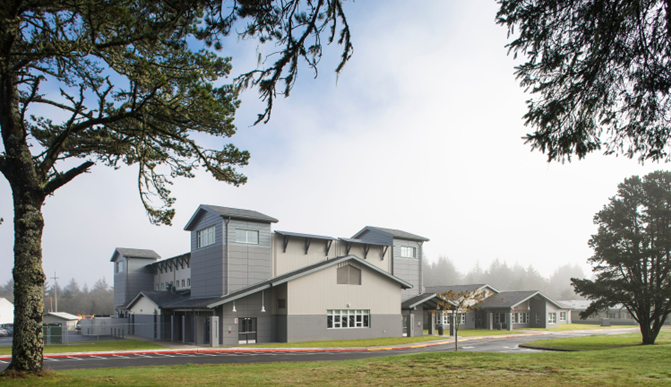- All Posts
- Seattle Central College to Decarbonize with Unique EcoDistrict Development
Seattle Central College to Decarbonize with Unique EcoDistrict Development
McKinstry Awarded Clean Energy Fund Grant to Lead Project
SEATTLE, Wash. (May 19, 2022) – Seattle Central College furthered its position as a leader in committing to sustainability, tackling climate change and reducing carbon emissions with the celebration of a successful collaborative effort with McKinstry to secure a $755,000 Clean Energy Fund grant from the Washington State Department of Commerce to establish an EcoDistrict on its campus.
Partnering with McKinstry, the college will soon be home to a novel EcoDistrict configuration and associated system control strategies which will generate 160-degree heating to the water supply using commercially available air-water and water-water heat pumps, with future expansion potential to serve neighboring buildings. The project will efficiently convert aging buildings to electric heat pump systems without removing existing hot water coils or HVAC configurations, reducing costs and allowing the school to contribute to Washington successfully meeting its nation-leading building decarbonization goals.
An EcoDistrict establishes a shared-energy standard for buildings, where unnecessary waste is eliminated, and zero-carbon efforts are accelerated. EcoDistricts offer a new vision for the built environment that has the power to forever change how buildings function, the impact they have on our environment, how occupants and communities interact with them and how they interact with each other.
“This project is critical to the college achieving several key goals,” Seattle Central College Interim Vice President of Administrative Services Lincoln Ferris shared. “First, the college is committed to sustainability and achieving the state’s goal of reducing our greenhouse gas footprint by 50%. We expect the EcoDistrict to be the linchpin of switching away from fossil-fuel generated heating and cooling. Second, we desire a predictable and reliable cost for our utilities. The EcoDistrict has the promise of leveling our energy consumption and central plant maintenance costs into one per square foot assessment. Third, we face a deferred maintenance backlog in the tens of millions of dollars for our existing central plant and associated steam piping. The EcoDistrict will allow us to address this in a comprehensive, one-time capital investment.”
The Seattle Colleges’ mission includes building healthy and economically viable communities by preparing students for lifelong learning opportunities. With a focus on providing a world-class education where students learn about sustainability and prepare to tackle these challenges, school leaders also understand campus operations play an important role in exemplifying a college’s commitment to sustainability. Together, the result is sustainability projects that improve on-campus systems and learning environments and engage students at the same time.
Mr. Ferris continued, “More than just helping the college achieve our greenhouse gas reduction goals and a net zero carbon status, the EcoDistrict is an investment in a living laboratory that will offer faculty and students the opportunity to solve real-world problems in partnership with McKinstry.”
Seattle Colleges Director of Facility Operations and Capital Projects Craig Grosinger shared his excitement about these trailblazing projects and partnership, “McKinstry has not just audited, designed and installed energy saving equipment for all three colleges, they have also assisted us in getting multiple grants for fantastic projects. This has been a real win-win relationship. We are honored to share our successes with our students, faculty, alumni and communities.”
McKinstry President and Chief Market Officer Ash Awad celebrates the institution’s robust and ambitious efforts. “The climate, affordability and equity crises deserve our time, focus and creative solutions. Seattle Colleges is stepping out in front, embracing its role as leader, educator and innovator, setting in motion changes that empower the organization, its students and the communities the colleges are part of to work collectively to find solutions for society’s most challenging problems.”
The EcoDistrict project is currently in the final stages of design by McKinstry. A final set of permit-ready plans and a “not to exceed” guaranteed maximum cost estimate are due in late summer to the Seattle Colleges.
In response to the passage in 2019 of the Washington State Clean Buildings bill, the Seattle Colleges commissioned a feasibility study to replace the aging steam heating system at Seattle Central College. The steam heating system was at the end of its expected life. In line with the bill’s mandate to lower costs and pollution from fossil fuel consumption in all state buildings, replacing steam with low-carbon heating and cooling systems will lower the Colleges’ collective greenhouse gas footprint.
Based on the findings of the feasibility study, in February 2022, the Seattle Colleges Trustees approved the commissioning of final design documents. Seattle Central anticipates contracting for construction of the EcoDistrict facility under the state’s Energy Savings Performance Contracting Program in the fall of this year.
All Three Seattle Colleges are Making Strides to Fund Improvements
Seattle Central College isn’t celebrating its energy efficiency and carbon reduction successes alone. In May 2021, all three Seattle Colleges received Washington Department of Commerce Energy Efficiency grants, the only higher education institutions to be awarded such grants in this round (and all from the same multi-college district!). South Seattle College received $351,297, North Seattle College was awarded $386,974 and Seattle Central College received $268,443 with each pursuing campus-wide improvements to systems like HVAC, heating/cooling, lighting, plumbing, sensors and controls, and more.
Even more, in January 2022, all three colleges were awarded Department of Commerce solar grants, with Seattle Central College receiving $130,047, North Seattle College receiving $117,961 and South Seattle College awarded $119,905, all to install solar arrays on campus facilities.
The EcoDistrict project also includes a related grant awarded to Seattle City Light in the amount of $150,000 for analysis and collaboration on the preliminary design of the EcoDistrict.
Seattle Colleges’ recent grant awards for work to tackle climate change and sustainability total roughly $2.28M.
Contacts:
Seattle Central College – Adam Russell, Director of Communications, (206) 934-3848
McKinstry – Cameron Bell, Communications Manager, (303) 517-1163
# # #
About Seattle Colleges
Seattle Colleges is Washington state’s largest college district, with more than 45,000 students enrolled each year. It is composed of Seattle Central College, North Seattle College, South Seattle College, and five specialty training centers. Seattle Colleges offers more than 130 workforce education and training programs that lead to bachelor’s degrees in high-growth industries, associate degrees in various disciplines, certificates in professional-technical programs, and transfer degrees to universities throughout the United States, as well as numerous certificate programs.
About McKinstry
McKinstry is a national leader in designing, constructing, operating and maintaining high-performing buildings. From new construction and ongoing operations to adaptive reuse and energy retrofits, the company provides a single point of accountability across the entire building lifecycle. McKinstry focuses on people and outcomes to ensure the built environment serves owners, operators and occupants alike. McKinstry is your trusted partner for the life of your building. Learn more at www.McKinstry.com.
Explore Other News

McKinstry and Green Sports Alliance Partner on Energy Dec…
The Green Sports Alliance (GSA) released its latest Play to Zero Playbook, Energy Decarbonization, focused on decarbo…

Denver International Airport Celebrates Earth Day With Bi…
Historic EPC Project progress report shows DEN’s energy and water reductions tracking with Vision 100 Strategic Plan …

Small Coastal School District Implements Onsite Microgrid
Grays Harbor County, Wash. (April 18, 2024) — Western Washington rural K-12 school district, Ocosta, is partnering wi…